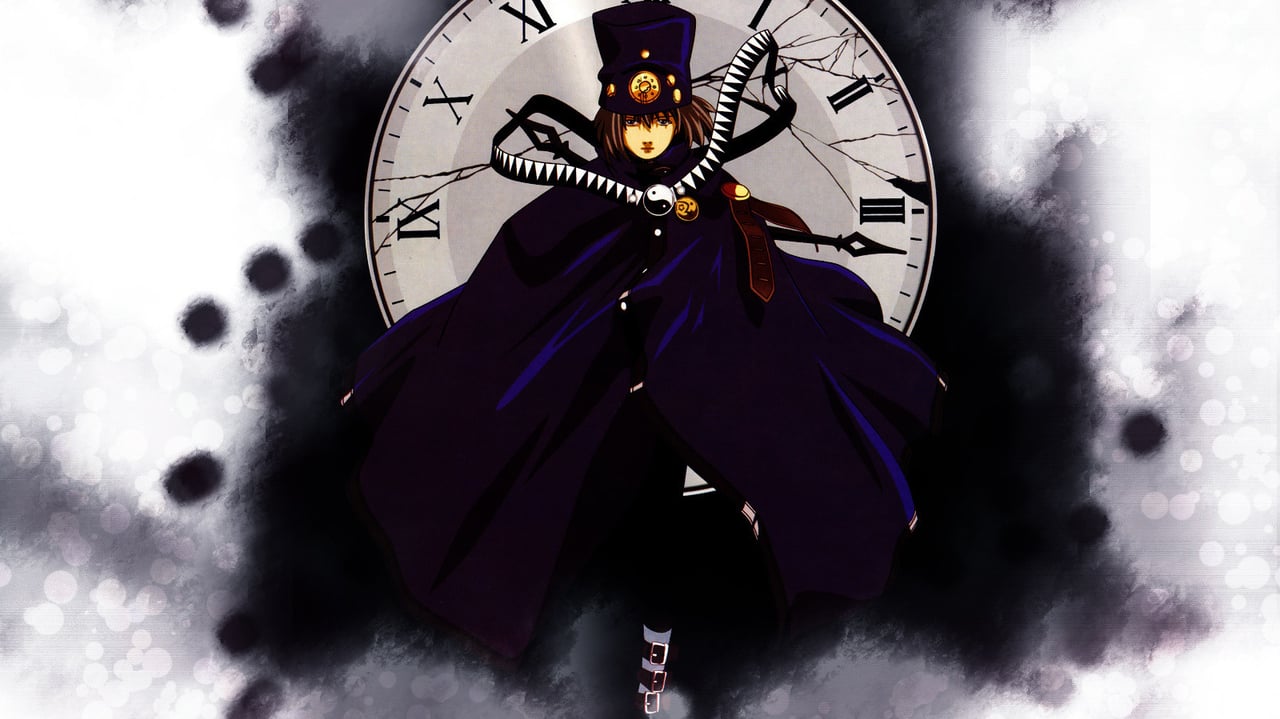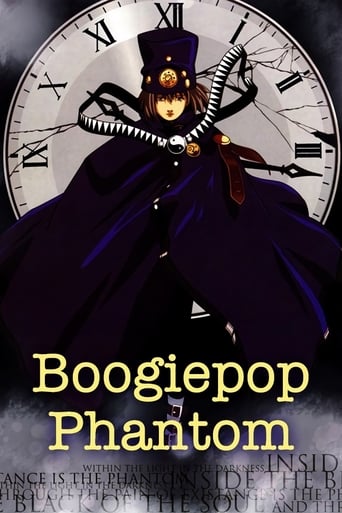

Very very predictable, including the post credit scene !!!
... View MoreI wanted to like it more than I actually did... But much of the humor totally escaped me and I walked out only mildly impressed.
... View MoreI didn’t really have many expectations going into the movie (good or bad), but I actually really enjoyed it. I really liked the characters and the banter between them.
... View MoreBlistering performances.
... View MoreWhy is it that anime always sounds so much worse than it really is? You may think you've seen it a hundred times before: a group of teenagers being stalked by a murderous supernatural entity. But believe me, you haven't.'Boogiepop Phantom' tells the story of the most ordinary group of high-school students whose lives are all changed by a series of grisly murders (the suspect is Boogiepop, a modern Angel of Death) and a mysterious light appearing in the sky. That is all I can say without giving away too much. The plot twists and turns fiendishly, constantly challenging the viewer's brain. Perhaps that is the series' downfall: it is at times very confusing, and the non-linear narrative takes some getting used to. I have heard of a live-action prequel, but I am not the only one who cannot even dream of finding something like that in their country. However, those who do not mind giving what they're seeing some thought won't have too much trouble.However, where 'Boogiepop Phantom' truly excels is in its handling of its predominant themes, the first being death. Virtually all the main characters have in some way been touched by it, and Boogiepop herself is a personification of it. Yet she is far from evil: at one point, a seemingly happy girl muses something along the lines of, "I hear it comes for special children. I wish it would come for me too." This may sound a touch overly pessimistic, but such is these children's desire to be 'special'; as well as to simply escape reality.Which brings me onto the second theme: that of growing up in an entirely adult-orientated world. The way this series depicts the pains and joys of adolescence is simply a wonder to behold. All the issues modern teenagers have to contend with (from sex and drugs to schoolwork, from friendship and love to continuous pressure to excel) are shown as vivid, sometimes heartbreaking metaphors: a girl who can grant wishes becomes enslaved to her brother's destructive impulses; a girl who fails a piano exam is magically given innocence and happiness, only to commit suicide on seeing her piano. The world of 'Boogiepop Phantom' is a dark and cruel world: a world where the only true escape may be death.But in the midst of it all, love and innocence still survive. Such gems as the previously mentioned boy carving a charm for his sister, nearly moved me to tears. Or, in one of the final episodes, three of the characters who played a key role in the unfolding of the events settle down to write their final exams. Without any bells and whistles, this bittersweet episode strikes just the right chord: we all have to grow up, but how much of our childish hearts we retain is up to us.Add to that some philosophical questions such as 'What is consciousness?', 'What is reality?', and 'Why are we alive?', and you get a truly magnificent narrative.Lastly, there is the style. Some reviewers have criticised the dark palette, but in my opinion it suits the dark, creepy atmosphere perfectly. Please note, however, that 'Boogiepop Phantom' is not horror per se. There are several bursts of truly shocking violence, but these only serve to emphasise the internal anguish of the characters. In conclusion, I recommend this series to anyone with an open mind and a willingness to think. The series is more geared towards adults, but who knows, perhaps teenagers would understand it even better. This is, after all, a far better reflection of their lives than High School Musical.
... View MoreI must admit I giggled when I heard the name "Boogiepop Phantom" at first. It had the sound of a cheap 60s cartoon that combined Scooby Doo's ghosts and Archie's bad music. Nothing could be further from the truth.BPP is an anime, but much more than that. It is a show that is rather difficult to describe, but I'll try. "Boogiepop" is something of an urban legend, like the Boogieman, a being that takes people at the end of their life, or something like an angel of death. However, people living now claim to have seen Boogiepop. In addition, there was an unexplained column of light that appeared, people missing, a serial murderer that suddenly stopped years ago, and an abandoned Amusement Park that is suddenly coming to life. That just scratches the surface.What is impressive about BPP is the way the story is told. The 4th episode happens before the first three. We are introduced to major characters in the first episode who do not appear again for a few episodes. Things happen on screen out of time with the rest of what's going on. Overall, the show should be one that fans of X-Files, The 6th Sense, or the Twilight Zone should enjoy. That's a challenging show that will make you use your rewind button more than once.
... View MoreIf you liked «Lain», you will LOVE «Boogiepop phantom» which is, in my view, much more interesting. Every episode has its own story, and can be watch by itself. As the story progresses though, it all fits together to form a larger plot. One last thing; the music is excellent and very well used to create intensity.
... View More"Boogiepop Phantom" (2000) is a 12-part TV series that takes Japanese animation into some of the new psychological dimensions pioneered by "Serial Experiments Lain" back in 1998. Like "Lain," it focuses on a cast of troubled Japanese high school kids, but steers clear of the earlier series' cyberspace trappings, drawing instead on the more subtle horror stylings found in such live-action Japanese successes of recent years as RING and UZUMAKI. Most of the teens highlighted in "Boogiepop" are visited by imaginary characters or "see" things or people that their classmates can't. The elusive female title figure, a self-proclaimed "Angel of Death," appears on occasion to try to intervene on behalf of the tormented kids. One seemingly normal girl, Nagi Kirima, emerges as the series' sole heroine. Not untouched by trauma herself, she is aware of all the weird goings-on and actively tries to investigate and do something about them. Based on a popular series of novels by Kadono Kouhei (as yet unavailable in English), the series plays interesting tricks with time, jumping back and forth between past and present incidents in the teens' lives, often presenting certain events from different characters' viewpoints. Five years earlier, strange phenomena occurred in the small Japanese city where the series is set, set off by an inexplicable beam of light that burst forth at night from the city up to the sky. A series of unsolved killings took place around the same time. All of the characters in the cast were irrevocably affected by that time and experience frequent flashbacks to those events. Eventually, in the course of the 12 episodes, it becomes clear, at least to this reviewer, that the series is really about the psychic pain of growing up in the Japanese social system. Children are not adequately protected by the adults in their lives and their childhood dreams are inevitably shattered quite early. One fanciful imaginary character, Poom Poom, who seems to have emerged from the psyches of two separate wounded souls, acts as a Pied Piper to all the troubled kids, inviting them to an abandoned amusement park that comes to spectacular life at his command. One riveting scene, arguably the key to the whole series, involves a confrontation at the park between Poom Poom and the indignant Boogiepop herself. The stories behind Poom Poom's creation are particularly heart-wrenching and reflect the kind of everyday trauma that creative, sensitive kids experience quite frequently, not just in Japan, but in almost any large, faceless bureaucratic school system. The live-action film BATTLE ROYALE, a major Japanese hit of 2000, offered a similar message of indictment of Japanese society and its treatment of children, but the longer form "Boogiepop" takes a less visceral, more multifaceted approach, relating the kids' stories one by one and detailing exactly what went wrong and at what point."Boogiepop" has been accomplished via the digital animation process that dominates Japanese animation today. While the digital process is often simply a lazy substitute for the greater complexity of hand-drawn artwork, it is used quite creatively here and is well-suited to the particular psychological mood created by the shifting points-of-view and subjective storytelling. This is a far cry from traditional Japanese animation and its stylistic advances should be judged on their own merits. "Boogiepop Phantom" stands out as an extremely demanding and challenging piece but one that will strike the more serious fan as an anime work of art, employing technical skill, visual imagination and keen insight to illuminate the hidden layers of the human condition.
... View More